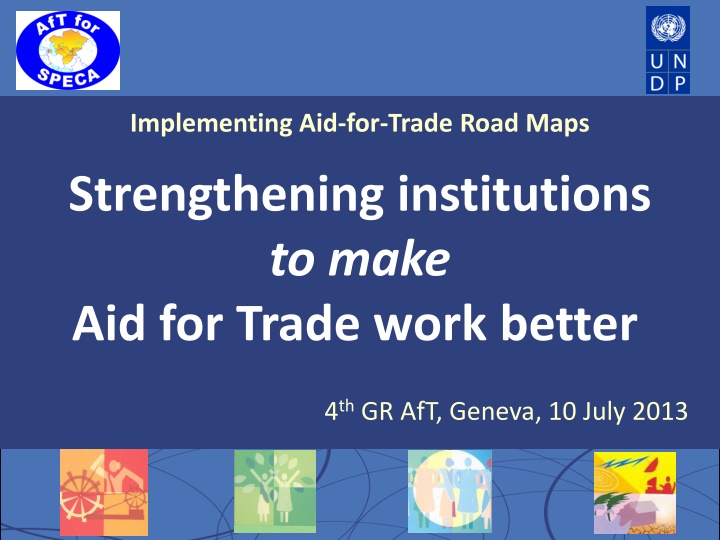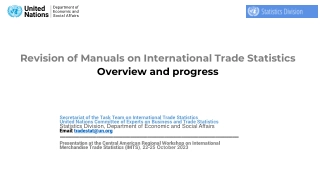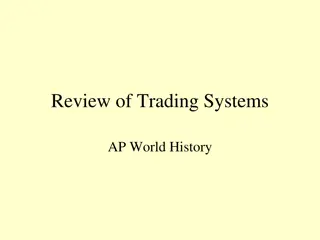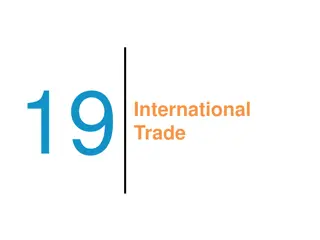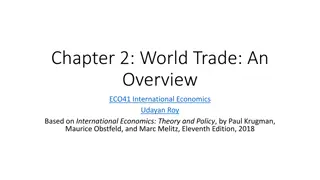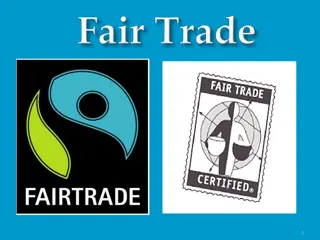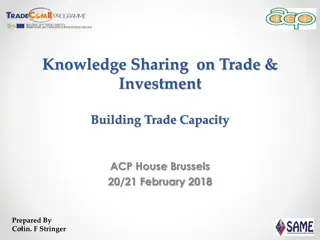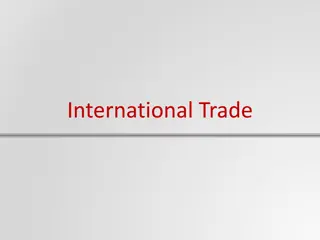Strengthening Aid for Trade Governance for Better Results
Capacity matters in Aid for Trade implementation, emphasizing local resources and sustainable change. Lessons learned stress finance versus strategy, institutional capacity development, and engagement of private sector for effective delivery.
Download Presentation

Please find below an Image/Link to download the presentation.
The content on the website is provided AS IS for your information and personal use only. It may not be sold, licensed, or shared on other websites without obtaining consent from the author.If you encounter any issues during the download, it is possible that the publisher has removed the file from their server.
You are allowed to download the files provided on this website for personal or commercial use, subject to the condition that they are used lawfully. All files are the property of their respective owners.
The content on the website is provided AS IS for your information and personal use only. It may not be sold, licensed, or shared on other websites without obtaining consent from the author.
E N D
Presentation Transcript
Implementing Aid-for-Trade Road Maps Strengthening institutions to make Aid for Trade work better 4th GR AfT, Geneva, 10 July 2013
Capacity matters! The old model has been based on the mistaken assumption ... that it is possible simply to ignore existing capacities and replace them with knowledge and systems produced elsewhere a form of development as displacement, rather than development as transformation Make the most of local resources, people, skills, technologies Favor sustainable change Take an inclusive approach in addressing power inequality Emphasizes deep, lasting transformations through policy and institutional reforms Value bestfit for the context over bestpractice
Strengthening Aid for Trade governance to deliver more and better results
Many options, same goal Sector wide Approach (pool funding) Coherence Sector wide Approach (budget support) Programmatic support Project-based delivery Sophistication
Aid for Trade / EIF in Cambodia AfT Disb. USD mil.
Delivery platform in Arab States IDB (ITFC), Sweden, Kuwait, Saudi Arabia partnered with 5 UN agencies to spearhead regional integration contributing to inclusive growth, non-traditional exports and employment creation 1. Project development facility to realize trade-related aspirations (UNDP led) 2. Capacity strengthening of regional organizations to implement PAFTA (UNCTAD led) 3. Support to trade reforms including NTB, TBT, and strengthening of trade support institutions (ITC/UNIDO led) 4. Skills development strategies in sectors with high export potential (led by ILO)
Lessons learned Focus on finance vs. strategy is a recipe for disaster Institutional capacities need to be developed across the board: quick wins and long term investment Role of lead agency as a champion (national / regional) Engage private sector Donor coordination is quicker said than done Learn from other sectors: health, education, etc. Focus on implementation, accountability and results Don t be over-ambitious, be aware of capacity constraints
Strengthening institutions to make AfT work in Central Asia
Trade & allocation of food resources Trade policy: 1. Provide instruments for ensuring food security 2. Provide means for overcoming hunger 3. Ensure appropriate balancing between short- and long- term impacts of sectoral allocation on Aggregated national welfare Value addition/sector, value adding/labour, employment, etc. 4. Streamlining trade policy to improve frame conditions for increasing productivity of labour, capital, and land
AfT increasing availability of food Trade support institutions: 1. Task: increase competitiveness of trade stakeholders 2. Means: capacity development for stakeholders to raise productivity Agricultural production: vocational training, demand-oriented short-term courses Agro-processing: demand-driven management training, support to affordable access to improved technology Agro marketing: access to & applying market information Reducing transaction costs: opportunities for clients on feed-back to trade politicians
AfT support to TP (I) Capacity development for increasing productivity Trade Policy - support to institutional development Alignment of legislation and regulations to CU (KGZ) Trade policy papers on FTAs, WTO, CU accession (KGZ, TJK, UZB) Legal review of trade documents and WTO requirements (KGZ, TJK) Cost-benefit analyses of CU accession (KGZ, TJK, UZB)
AfT support to TP (II) Capacity development for increasing productivity Trade Policy - support to institutional development Expert Working Groups at national and at Oblasts level on trade policy documents (TJK), Inter-ministerial committee on CU (KGZ) Expertise in formulating trade related policy documents (TJK, UZB) Implementation of NES Strategy 2013-2017 and action plan (KGZ) Mainstreaming trade and PEI in national platforms KGZ)
AfT support to TD institutions (I) Capacity development for increasing productivity Trade Development trade support institutions Needs and capacity assessment of stakeholders (KGZ, TJK, UZB) Transition from Single Window into Export Promotion Agency (KGZ) Access to market information through marketing platforms (KGZ, TJK)
AfT support to TD institutions (II) Capacity development for increasing productivity Trade development National and Oblasts Trade Promotion Centres (KGZ, TJK, UZB) Business Associations and CCI strengthened in lobbying capacity on improving business environment (KGZ, TJK, UZB) Elaborating trade policy documents at PPD platforms (TJK) CCI organising participation at trade fairs and biz forums (KGZ, TJK, UZB)
AfT support to BPC institutions Capacity development for increasing productivity Building Productive Capacities Needs and capacity assessment of stakeholders (KGZ, TJK, UZB) Trade Capability Programme at national and Oblasts level on export standards for agro-processing companies (TJK) Upgrading value chains through access to improved technology via Small Grants Programme (TJK, UZB)
REGIONAL CENTER for EUROPE AND CIS Bratislava, Slovakia http://europeandcis.undp.org/poverty joern.rieken@undp.org BUREAU OF DEVELOPMENT POLICY New York, United States www.undp.org/poverty/focus_trade_ip_migration.shtml massimiliano.riva@undp.org
